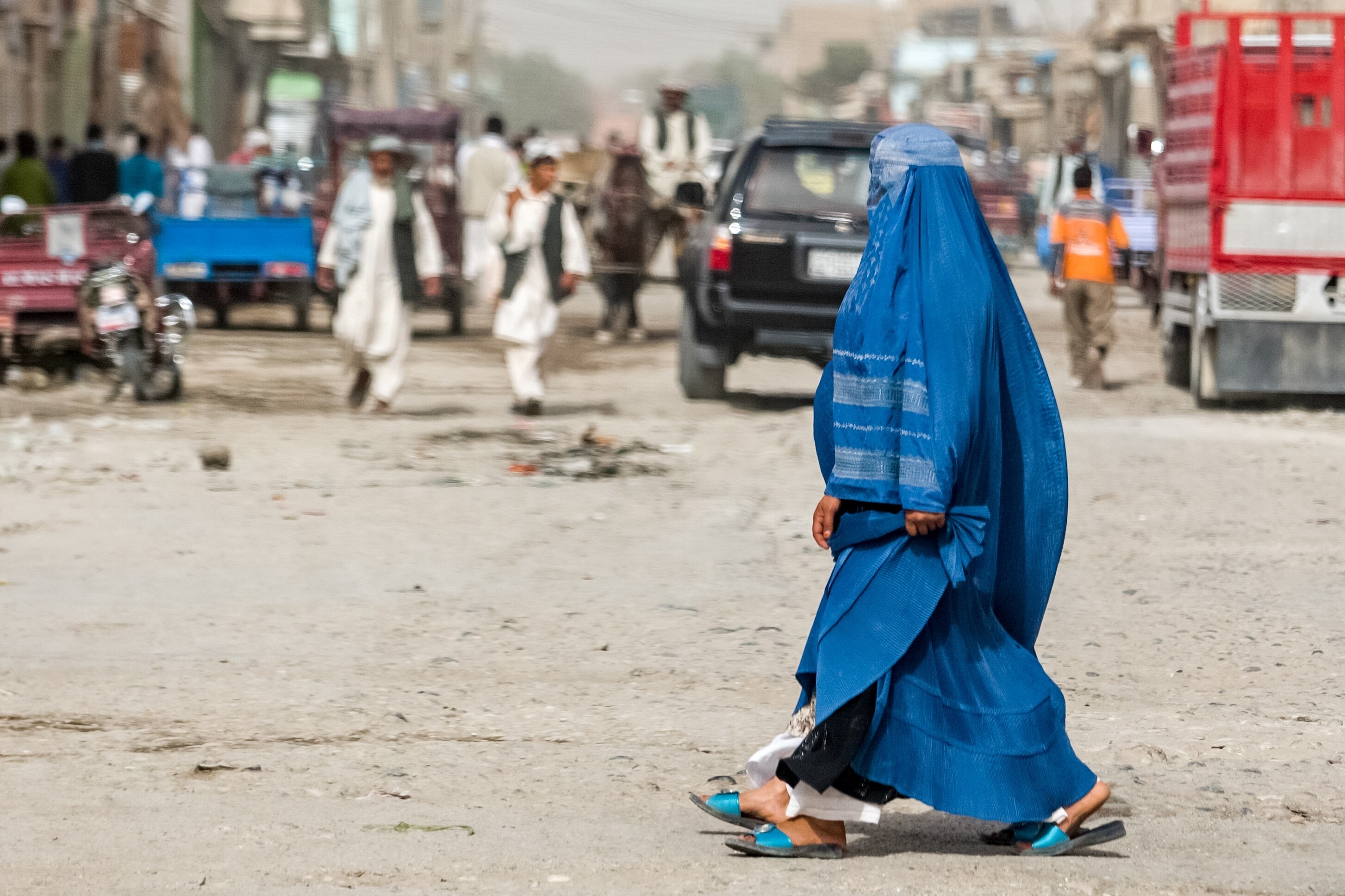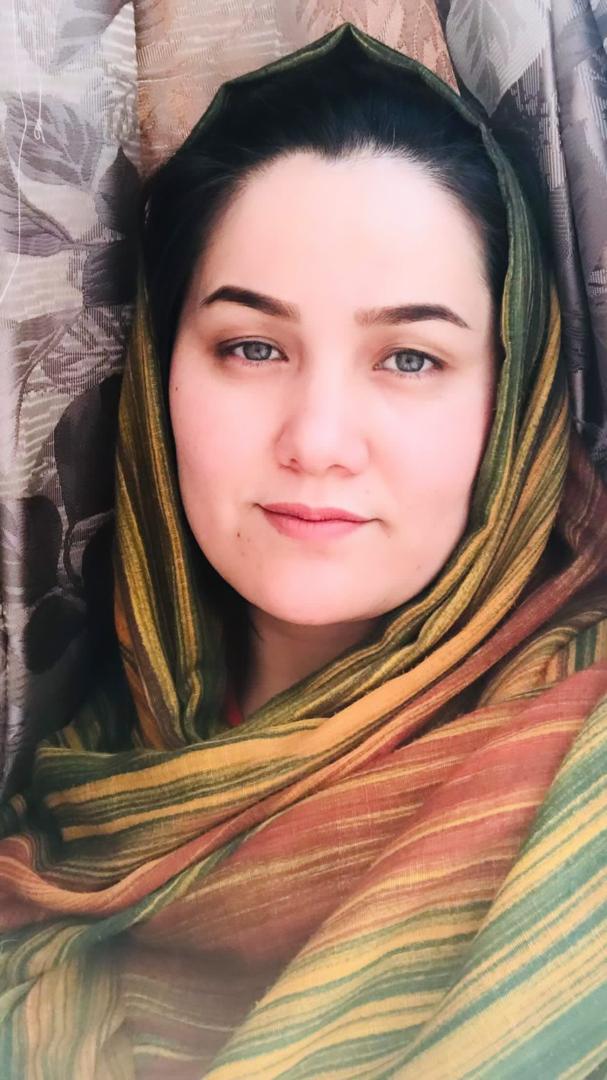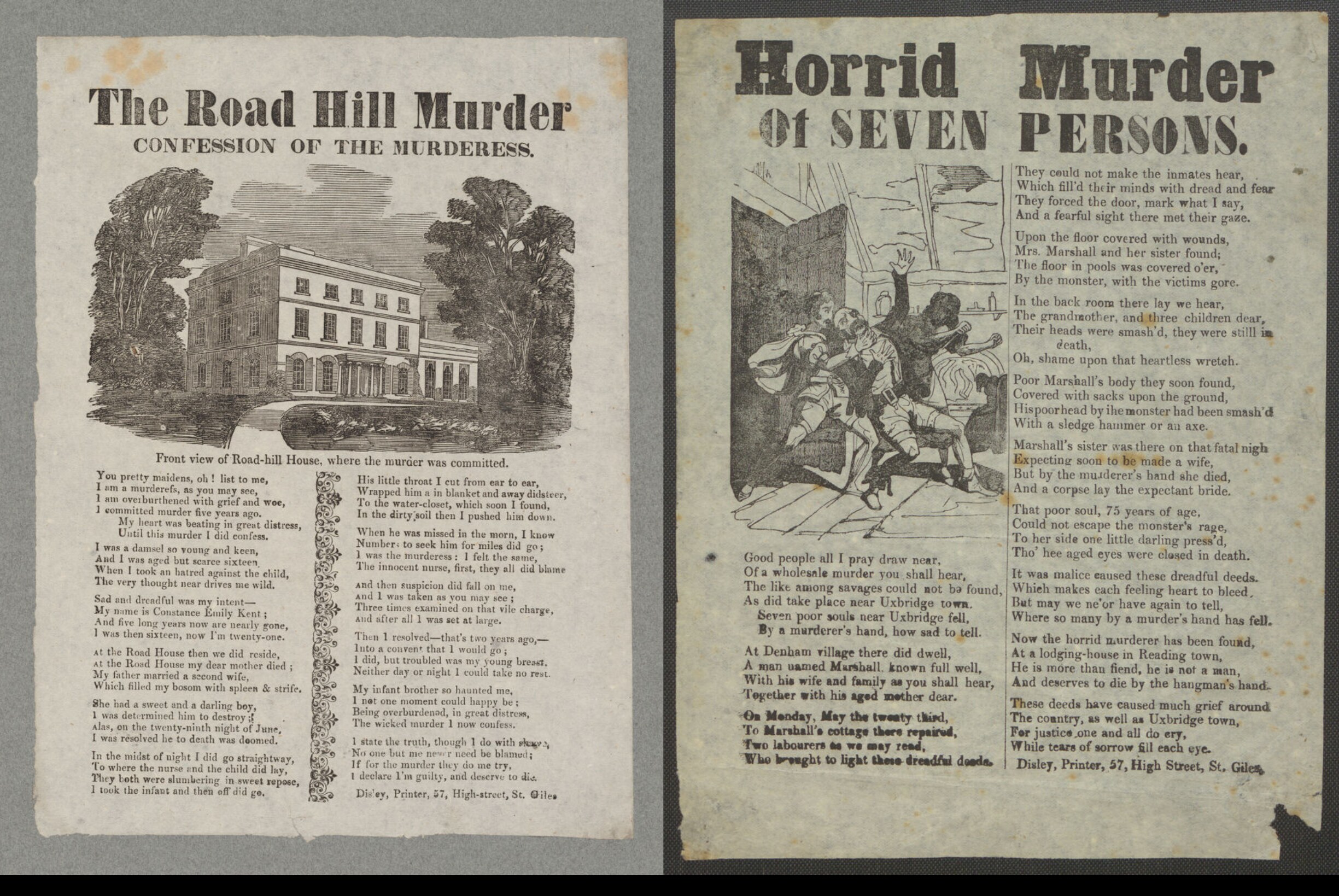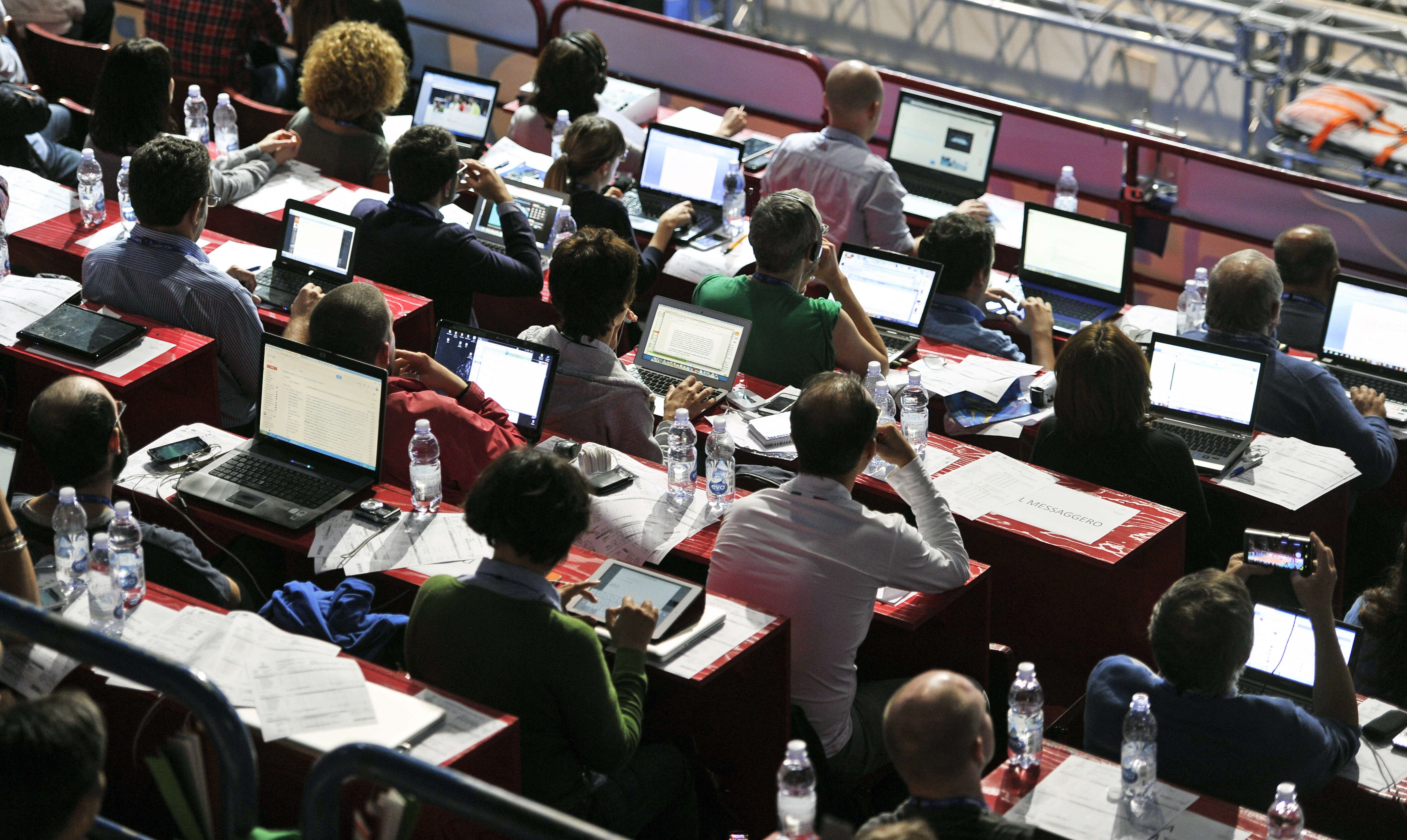انصبت النقاشات في مؤتمرات كثيرة عقدت للحديث عن الصحافة الثقافية، على نخبوية الصفحات التي تحتويها الجرائد اليومية، بسبب أنها موجهة إلى جمهور من المثقفين والمهتمين، كما أنها دورية ومتباعدة النشر والبث، وقليلة إذا ما قورنت بالصحافة الرياضية أو الاقتصادية. يضاف إلى ذلك، نقد حاد مردّه غياب السياسات التحريرية المهنية في هذا اللون المتخصص من الصحافة، وعدم اهتمام أصحاب المؤسسات الإعلامية به لأنهم يعتبرونه غير مفيد من ناحية الإعلانات والرعايات.
على الجانب الآخر، كان الاتهام يوجه أيضا إلى الجامعات وأقسام تدريس الصحافة، إذ هناك ندرة في أعداد الخريجين المهتمين أو المؤهلين لهذا اللون من الصحافة المتخصصة.
من هنا، كانت الرغبة كبيرة عند القائمين على كتاب "الصحافة الثقافية"، الذي حرره الكاتب الصحفي صالح مشارقة، وأصدره مؤخرا مركز تطوير الإعلام في جامعة بيرزيت.
الكتاب الرصين الذي طبع وأتيح على موقع المركز (1)، يمثل فعلا حقيقيًّا يهدف إلى مَهننة عملية إدخال الفنون الصحفية كحل لتفعيل وتجديد وإعطاء الصحافة الثقافية تفاعلات جديدة، عبر اطّلاع خريجي الإعلام عليها كي تصبح من صميم عملهم اليومي وتغطياتهم الدائمة.
ويطمح مشارقة من خلال تدريس الصحافة الثقافية إلى "تلبية حاجة المؤسسات الصحفية لهذا اللون من الصحافة المتخصصة، بالإضافة إلى خروجها من قالب كتابةٍ ارتبط بكتابات الأدباء أنفسهم". فالقائمون على هذا الجهد الكبير يبتغون العمل على تشغيل الفنون الإخبارية في نقل الحياة الثقافية، يوميًّا وليس دوريًّا كما درجت العادة في الصحافة الثقافية، ولضمان فرص عمل جديدة في الصحافة للخريجين الجدد الذين تقول الإحصاءات إن نسبة البطالة فيهم ضمن الأعلى بين خريجي العلوم الإنسانية، بحسب مشارقة.
والكتاب الجديد (285 صفحة) هو الخامس من سلسلة مساقات أنتجها مركز تطوير الإعلام ضمن محور التطوير الأكاديمي (2) في مبادرة تطوير الإعلام، وهي: الإعلام والنوع الاجتماعي، والإعلام والقانون، وأخلاقيات الإعلام، والصحافة الاقتصادية، حيث أشرف على تأليفه 14 صحفيا وكاتبا وأديبا ومخرجا وأكاديميًّا، بكتابة 13 فصلا حاولت أن تجمع مختلف صنوف الحدث الثقافي والفني. والمؤلفون هم: الروائية ليانة بدر، والصحفي صالح مشارقة، والشاعر والناقد وليد الشيخ، والفنان منذر جوابرة، ورسام الكاريكاتير عماد حجاج، والصحفي الثقافي أسامة العيسة، والشاعر خالد جمعة، والأكاديمية محاسن ناصر الدين، والسينمائي جورج خليفي، والإعلامي عارف حجاوي، بالإضافة إلى المسرحي فتحي عبد الرحمن، ونورا بكر، وأنس أبو عون العاملين في حقل الفنون الأدائية، وخبير الإدارة الثقافية يسري درويش. وجميعهم أسماء معروفة في حقولهم الثقافية والفنية والأدبية.
منهجية الكتاب
الكتب في المجمل، والتعليمية تحديدًا، تُكتب وفق مناهج ورؤى مختلفة، وبالتالي لا توجد طريقة واحدة فقط لتأليف كتاب خاص بتدريس مجال معين. وهذا أمر ينسحب على هذا الكتاب. فثمة من المؤلفين من فضّل كتابة شهادة على الحقل الإبداعي الذي تناوله، ومنهم من أنتج مادة علمية مبنية على التزام أكاديمي، ومنهم من مزج بين المسارين ضمن منهج يمكن تسميته "تربية ثقافية" لطلاب دوائر وكليات الإعلام.
جاء ذلك وفق مستويين جرت المراوحة بينهما، وهناك من حاول الدمج بينهما، فقد عَرّف المؤلفون في المستوى الأول الدارس أو المهتم بالحقل الثقافي أو الفني الذي يكتب عنه وحوله، في حين تضمّن الثاني ربط هذا الحقل بعالم الصحافة ودورها، وكيف يمكن تغطيتها وتناولها بالمجمل.
جال المؤلفون في مساحة واسعة تحركوا فيها أثناء كتابة فصولهم، وجاءت كتاباتهم منسجمة مع طريقة تحرير الكتاب التي عكست روح كل مؤلف. ويمكن ملاحظة ذلك من خلال اختلاف اللغة وطريقة التعبير -مثلا- في فصل تغطية الموسيقى والأغنية عن فصل الإدارة الثقافية.
ومع ذلك، كانت هناك محاولة دؤوبة لربط كل موضوعات الكتاب بالتغطية الصحفية الخبرية، وكان التركيز دومًا على أهمية أن يكون مشبكا خبريا أو مدخلا يجعل الموضوع الثقافي يحظى بالاهتمام في عالم الصحافة على اختلاف مجالاتها، بحيث لم يتم التركيز على الصحافة المكتوبة كما يفعل البعض في كثير من الدورات. كما أن فصول الكتاب فصلت بين النقد في كل حقل ثقافي أو فني، وبين مسألة الكتابة والتغطية الصحفية للموضوع الثقافي.
وتقوم الفصول على أسلوب تأليف حدده مركز تطوير الإعلام يتمثل في "التعلم وليس التعليم"، و"التدريب نصف التدريس"، و"التفاعل مع ضيوف ومؤسسات خارج الجامعة"، و"لعب أدوار غرفة الأخبار"، وبالضرورة عدم الارتكاز على نمط المحاضرة فقط.
يمكن تقسيم فصول الكتاب الـ13 إلى سبعة أقسام، نجملها على النحو التالي:
1- الكتابة الصحفية الثقافية من خلال الفنون الإخبارية في الصحافة الثقافية، وصحافة المكان.
2- مجال الأدب، وجاء في فصول ثلاثة: تغطية الرواية والقصة في الصحافة الثقافية، والشعر ونقده وما قد تكون صحافة عنه، والصحافة الثقافية لأدب الأطفال.
3- الفنون الأدائية من خلال التغطية الصحفية للمسرح، وتغطية فنون الرقص والتراث والفولكلور.
4- التشكيل من خلال التغطية الصحفية للفن التشكيلي، وفن الكاريكاتير.
5- حقل السينما من خلال التغطية الصحفية للسينما، وتغطية الفيلم الوثائقي.
6- تغطية الموسيقى والأغنية.
7- الإدارة الثقافية.
وهي فصول عميقة ومليئة بالمعلومات والمعرفة التي ربما تفوق ساعات الدرس، لكنها تتجاوزه إلى تأسيس معرفة نظرية حول المجال الثقافي أو الفني.
كالعادة، واستمرارا لنهج مركز تطوير الإعلام في تقديم مساقات متخصصة، يسد الكتاب الجديد الفجوة الكبيرة بين حاجات طلبة الإعلام والسوق (ليس بالمفهوم التجاري) وبين ما هو متاح لدى المدرسين الجامعيين من موارد وكتب ومراجع، وهو أمر من حيث المبدأ تعبير عن حاجة، ويستحق أن يبذل في سبيله كل الجهد والتعب، مثلما تبذل الكثير من المؤسسات الأهلية والإعلامية جهودا كبيرة في تعزيز المعرفة التقنية/ الفنية لدى طلبة الإعلام.
إنه كتاب مفيد ليس للطلبة فحسب، بل يستجيب لحاجة ماسة للأكاديميين والصحفيين وللقراء عموما. وفي حدود اطلاعي، لم أر كتابا عربيا بمثل هذا التنوع والعمق وتنوع خلفيات المؤلفين، فبعض هذه العناوين/ الفصول تحضر على شكل جمل أو كلمات في كتب عربية لا تسد حاجة ولا تقدم بديلا.
وكان جليا في الكتاب أنه يحاول أن يؤسس لصحفي قادر على فهم الفنون واستيعابها، ومعرفة المجالات الثقافية كي يتمكن من الكتابة عنها عبر معرفة لا تكتمل بالكتاب بطبيعة الحال، لكنه يشكل بدايتها على الأقل. ذلك لأنه مفتاح مهم جدا لأي جيل من الصحفيين يرغب في تقديم المختلف والجديد. فقد حفلت قائمة المراجع في كل فصل بما يضمن تعميق المعرفة ومضاعفتها إذا ما رغب المدرس أو الطالب في ذلك.
بالمجمل، هذا عمل يستحق أن يدرج في خطط كليات الإعلام بدون نقاش. وقد تكون أهم إشكالية في عملية التدريس تتمثل في وجود الكادر الجامعي الأكاديمي المهتم والمؤهل لتدريس المساق الغني بالتنوع الذي لن يسمح بأي حالة من الملل. إنه مغامرة تنتظر الأكاديمي الذي يرغب في العمل على تدريس هذا المساق، وجل هدفه جعل الطلبة يقبلون على المساق ويفهمون محتواه ويتفاعلون مع مضامينه، وهي متنوعة وكثيرة.
أخيرا، يحمل غلاف الكتاب لوحة دالة ومعبرة للفنان الفلسطيني بشار الحروب والموسومة بـ "حقيبتي" (2014)، تعبّر عن مضمون الكتاب الغني.
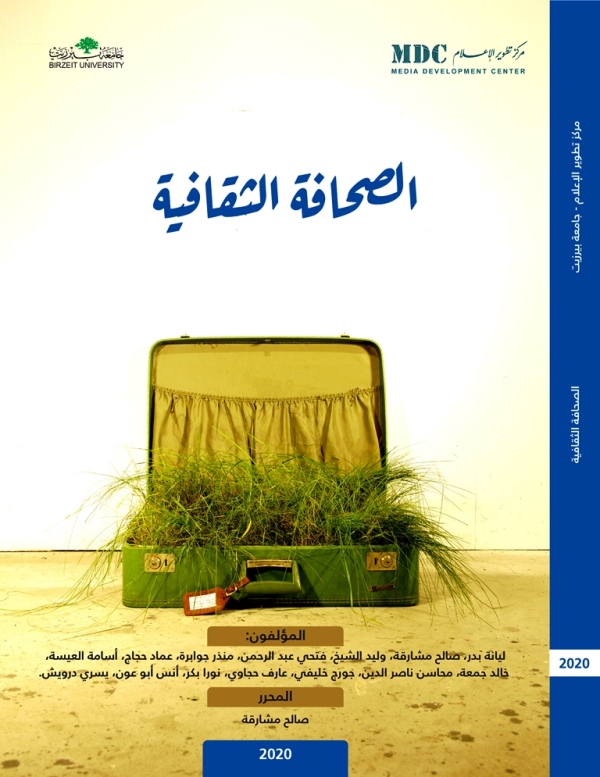
مراجع:
1- http://mdc.birzeit.edu/page-1102-ar.html
2- ضمن محور التطوير الأكاديمي، تتشارك في مشاريعه 18 جامعة وأربع كليات تدرّس درجتي البكالوريوس والدبلوم في تخصص الصحافة والإعلام. ويهدف المحور إلى تأليف ونشر مساقات جديدة لدوائر وكليات الإعلام، وتأهيل المحاضرين الجامعيين لتدريس هذه المساقات بوسائل تعليم وتعلم متحرر وتفاعلي وتدريبي. كما يهدف هذا المحور إلى التأثير على الخطط الأكاديمية لتخصص الإعلام لتفعيلها وتجديدها في كل الجامعات الشريكة. ويقوم مركز تطوير الإعلام بعقد الاجتماعات والشراكات وتنظيم زيارات التنسيق والتشاور على مدار العام لمواصلة هذا المحور، كما يقوم المركز بالتشبيك مع وزارة التعليم العالي وكل المؤسسات التعليمية ذات العلاقة.







































